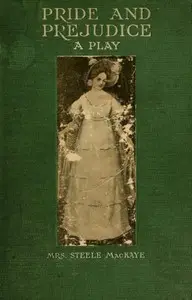"The Rivals: A Comedy" by Richard Brinsley Sheridan is a humorous play set in the 1700s that centers on love and mistaken identities involving Lydia Languish and Captain Absolute, who uses a false identity to court her. The story begins in Bath as Captain Absolute, under the guise of Ensign Beverley, chases after Lydia's affections, while his father wants him to marry someone else. Lydia shares the secret of her love for Beverley with her friend, Julia, and also shares her annoyance with her aunt, Mrs. Malaprop. This sets up the comedic confusion and romantic drama as the characters deal with family pressures and false identities to find love."

The Rivals: A Comedy
By Richard Brinsley Sheridan
In a world of social expectations and hidden identities, a young woman's romantic dreams clash with her aunt's marriage plans, sparking a whirlwind of laughter and love.
Summary
About the AuthorRichard Brinsley Butler Sheridan was an Anglo-Irish playwright, writer and Whig politician who sat in the British House of Commons from 1780 to 1812, representing the constituencies of Stafford, Westminster and Ilchester. The owner of the Theatre Royal, Drury Lane, in London, he wrote several prominent plays such as The Rivals (1775), The Duenna (1775), The School for Scandal (1777) and A Trip to Scarborough (1777). He served as Treasurer of the Navy from 1806 to 1807. Sheridan died in 1816 and was buried at Poets' Corner in Westminster Abbey. His plays remain a central part of the Western canon and are regularly performed around the world.
Richard Brinsley Butler Sheridan was an Anglo-Irish playwright, writer and Whig politician who sat in the British House of Commons from 1780 to 1812, representing the constituencies of Stafford, Westminster and Ilchester. The owner of the Theatre Royal, Drury Lane, in London, he wrote several prominent plays such as The Rivals (1775), The Duenna (1775), The School for Scandal (1777) and A Trip to Scarborough (1777). He served as Treasurer of the Navy from 1806 to 1807. Sheridan died in 1816 and was buried at Poets' Corner in Westminster Abbey. His plays remain a central part of the Western canon and are regularly performed around the world.

















